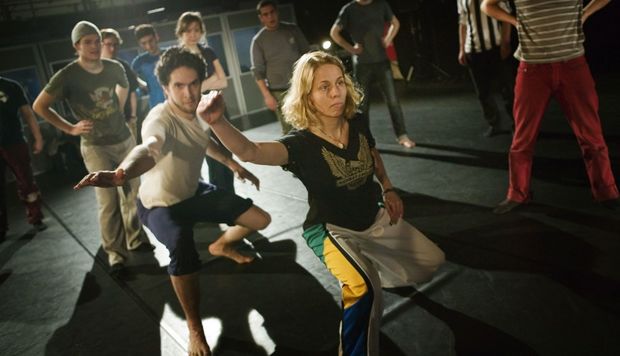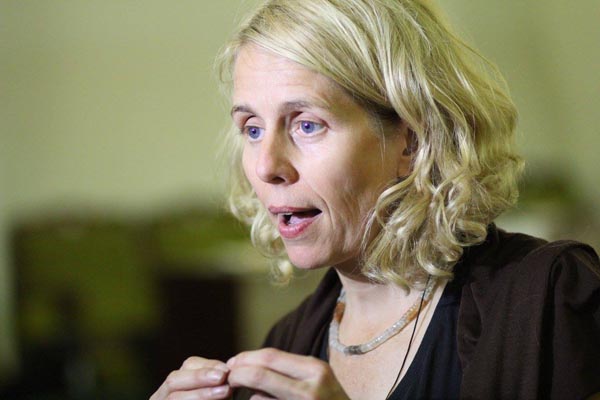Uta Plate to highlight role of theatre and creativity in prisons
28 January 2016
German theatre practitioner Uta Plate will lead a series of forums and workshops in New Zealand in February and March to highlight the role of theatre and creativity in prisons, in partnership with Goethe-Institut New Zealand and Arts Access Aotearoa.
 The three Creativity in Corrections forums, to be held in Wellington (10 February), Christchurch (29 February) and Auckland (3 and 4 March), will include panel discussions, practical workshops and networking opportunities,
The three Creativity in Corrections forums, to be held in Wellington (10 February), Christchurch (29 February) and Auckland (3 and 4 March), will include panel discussions, practical workshops and networking opportunities,
For the past 20 years, Uta has been running workshops and devising plays with prisoners, young people and asylum seekers in Germany and in countries such as Chile, Sweden, China, Turkey, Palestine and Russia.
“My last big project was about World War II and working with young people from Russia, Poland and Germany. There was an ensemble of 18, and we dived into stories about the war, digging deep and getting dirty.
“I’m very interested in the blind spots – what people don’t see or choose not to see. For me, theatre can connect us to the unseen pain and suffering in the world, making it visible and transforming it at the same time.”
Given the pain that Uta sees and uncovers, she says her work can be challenging. “But you have to always remain open, vulnerable and sensitive."
In early 2015, Uta spent three months as an artist-in-residence in Wellington, supported by Goethe-Institut New Zealand in association with the Wellington City Council and Toi Whakaari: the New Zealand Drama School.
Addiction the biggest stone
As part of the residency, she facilitated a one-day workshop called Move-Dance-Write with the 20 women undertaking the six-month programme in the Drug Treatment Unit at Arohata Prison and two students from Toi Whakaari. The workshop was co-ordinated by Jacqui Moyes, Arts in Corrections Advisor, Arts Access Aotearoa.
“Addiction is the biggest stone you can put around your neck and although some of the women were frightened, they were incredibly brave to risk their trust and work with us,” Uta says.
 She also appreciated the framework and ongoing support for the women, provided by CareNZ’s Drug Treatment Unit.
She also appreciated the framework and ongoing support for the women, provided by CareNZ’s Drug Treatment Unit.
Following the Wellington forum and with funding from Wellington City Council, Uta will lead a second workshop, called The Looking Glass, working with the 20 women currently in the Drug Treatment Unit at Arohata Prison. The other participants will be the clinical and Corrections staff, eight artists and writers, and Jacqui Moyes.
The focus of the nine-day project is addiction but Uta is clear that her workshops aren’t about therapy.
“My role is to provide some tools and ‘maps’ for participants to experience what theatre can offer,” she says. “I’m not there to judge anyone or offer therapy. What I’m hoping to achieve is that each person will see herself as a creative person, not as a victim. That they will say, ‘On stage, I can create anything and in life, I can do anything’. But they have to do the work. They have to make decisions and choices.”
Upskilling New Zealand arts practitioners and writers
As well as benefiting the prisoners, The Looking Glass aims to upskill New Zealand arts practitioners and writers so they can continue teaching creative expression in prisons and the wider community.
“In this collaborative theatre space, the artists and women will be taken out of their everyday lives to exchange ideas about humanity and the world,” Uta says. “We will all be co-authors, co-directors and co-choreographers.
“For the women in prison, it’s an opportunity to get in touch with their wealth of experience and realise their creative potential.”
Goethe-Institut New Zealand
Bettina Senff, Director of Goethe-Institut New Zealand, says Uta’s forums and workshops will provide opportunities for a two-way sharing of skills and experience.
“The Goethe-Institut is proud to bring Uta back to New Zealand,” Bettina says. “Uta is a gifted educator and theatre practitioner with a wealth of knowledge and tools to share.
“Feedback from her workshops last year shows that Uta's integrity, empathy and genuine engagement will make the forums and workshops a memorable, two-way learning process.”
A circle where everyone grows and connects
Uta describes the workshops as a “circle”, with the women at the centre and everyone contributing. Inside the circle, everyone grows and connects through movement and their minds.
She encourages feedback from the participants during and after the workshops to develop an atmosphere of truth and reflection.
“I think my skills are affecting people with my passion for theatre, and getting them to reflect on and analyse what’s happening,” Uta says. “On the one hand, you go with the emotional flow and on the other, you need to reflect on the how and why. How did that happen? Why did you make that decision?
"It's such an empowering process for people who aren't normally heard to go on stage and tell their stories. And for the audience to experience theatre that deals with things that matter."
The three Creativity in Corrections forums in Wellington, Christchurch and Auckland are free and open to the public. However, numbers are limited and you need to book by contacting Jacqui Moyes (04 802 4349 jacqui.moyes@artsaccess.org.nz).


